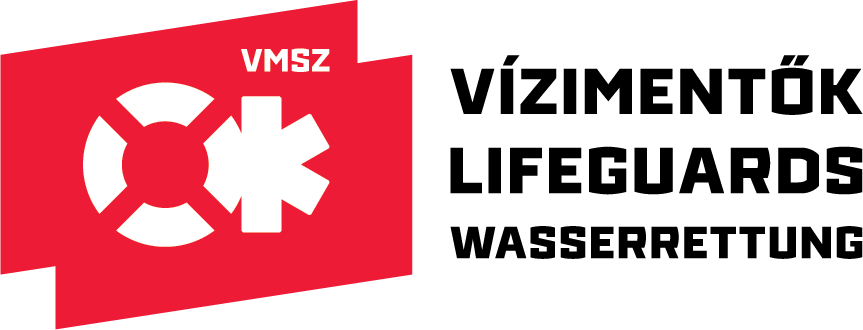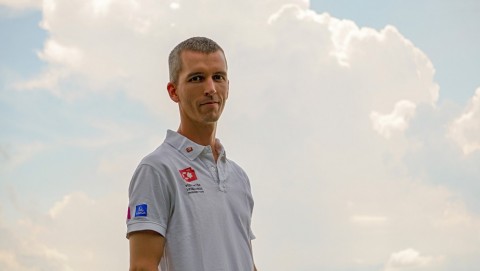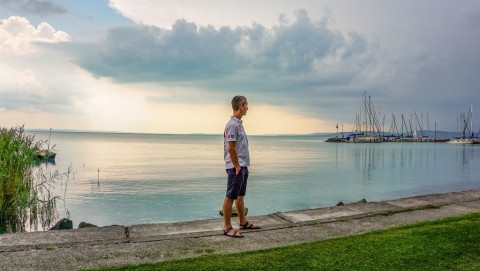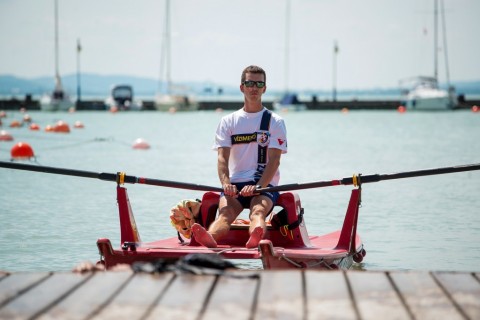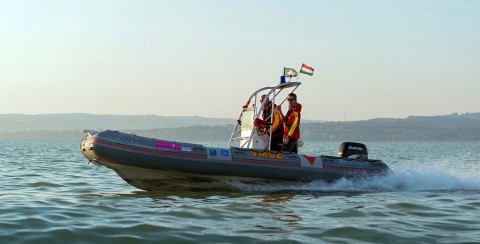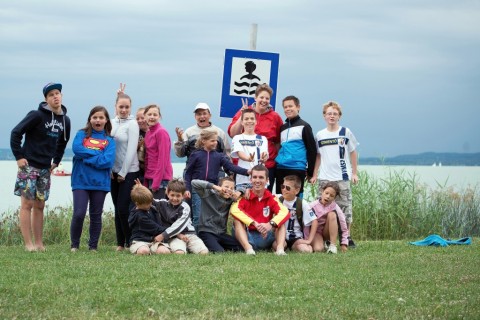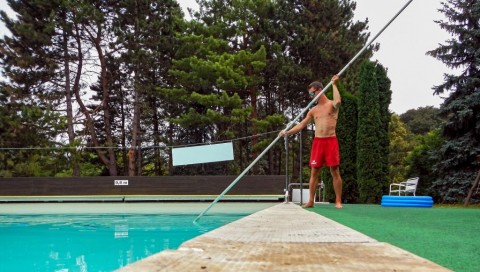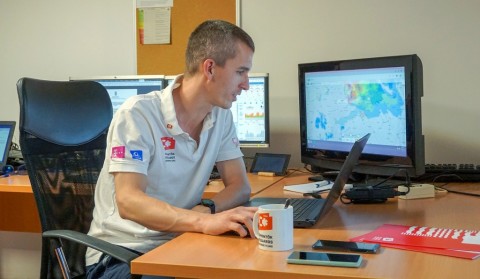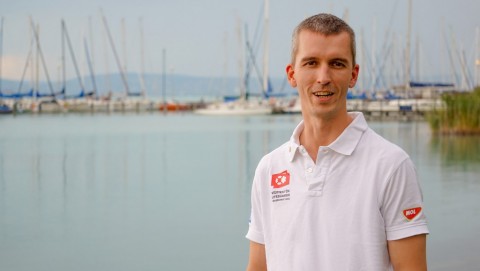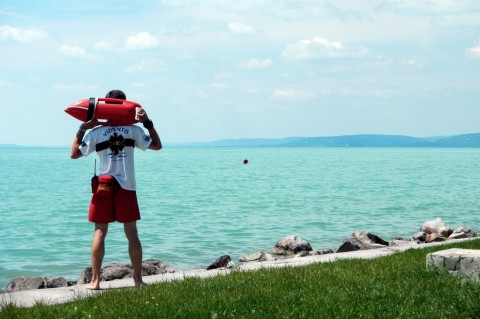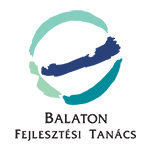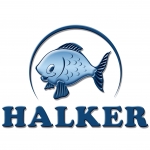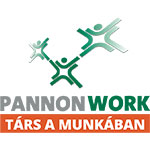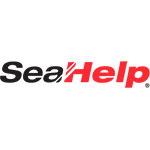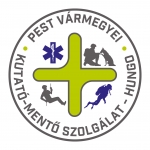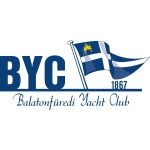Deeper Than It Seems - Portrait series 5.
„We try to prepare for every eventuality. Of course, that's impossible, but we always try."
Portrait interview with Zsolt Pásztor
I'm very curious about what you wanted to be when you were a child. Did you have any dreams or plans?
As a little kid, I had no idea what I wanted to be. I wanted to be everything, really, it changed every week. Later on, I even envied my buddies who already knew at 18 what they wanted to do and chose their studies accordingly in a targeted way.
What do you do in your civilian life?
Now I work for the Association all year round. Before, when I could only work for VMSZ during the summer season, I did a lot of other things alongside. For example, I taught swimming for a long time, and before that I worked as a salesman in the self-service warehouse of a furniture store.
Why did you decide to take the lifeguard course at that time?
When I got here, I didn't know anything about lifeguarding. I was just looking for some kind of serious first aid course to take. That's when I found this course. I read that the training also includes a two-day first aid course. I thought that even if I don't pass the course, but I take part in the first aid, at least I'll know that. It wasn't easy. The water was 18 degrees Celsius the whole time during the course, and I froze every day. I remember my knee was completely ruined by the middle of the course. Then I finally passed, and in the meantime, I really liked lifeguarding too and got stuck here.
If you could choose between lifeguard duty, boat service, or dispatcher tasks, which would you choose?
Definitely the dispatcher tasks, as you mentioned. I also love and am interested in the other areas of lifeguarding, whether it's the ones I mentioned or even teaching or running kids' camps. For me, the most exciting place is our dispatch center.
Why was it the Center that you found your place?
From the beginning, when I became a lifeguard, this place was the most interesting to me. As I learned more about it, I became more and more interested in what it would be like to work here. I knew from the beginning that this job requires a lot of experience, it doesn't happen overnight, so I tried to try my hand in as many areas as possible at VMSZ. Over time, I had the opportunity to spend more and more time on voluntary service in our Center as well. Then I realized that this was my primary aspiration, and it became even more obvious that this job requires extensive knowledge. I have been working as a shift leader for years, but every year I learn something new, run into some new situation. I love that we know about every event and are involved in its solution to some extent. No two days are the same, if it seems like nothing is happening, we are still preparing for the next days, monitoring the expected weather events and trying to prepare for every eventuality in advance. Of course, this is impossible, but we always try.
What are some of the qualities that help you greatly in this job?
Here are some of them that come to mind: determination, precision, good intuition, strong planning and communication skills, calmness in all situations, and cognitive empathy.
Who do you think would make a good dispatcher?
I can't answer that specifically. There are a lot of things that need to be met by someone who wants to be a dispatcher. It is a very complex job, and I could hardly even list its tasks, it is so diverse. It's no wonder finding replacements is challenging.
If you could, would you change anything about yourself? Or is Pásztor Zsolt just Zsolt Pásztor as he is now? ?
Of course, I always try to improve and change the qualities that would make me better, but overall I have long since made peace with myself, if I can put it that way. I have long accepted both my good and bad qualities, and I try to consciously get the most out of myself.
Is there a sentence, motto, thought, or quote that has helped you repeatedly in difficult situations?
I don't have anything specific like that. When I get stuck in some area, I always think of the advice of my predecessors. I always think about what they would do or what they would advise. I learned a lot from them, and I miss them often. Several of them no longer work here, and I can't ask them for advice like I used to.
Is there anything that can bother you immensely?
Unpreparedness. It really bothers me when people are messing around instead of doing their job professionally.
Could you tell me a story about a water rescue that left a mark on you?
There are many stories in my head that are lasting memories, but there is one that might be instructive for others and that I remember better as well. It was a sunny and windless summer day. We were already getting ready for the radio sign outs in the evening when we saw and received information that a sudden big storm was about to hit the area we were responsible for. Accordingly, we started to get everyone out of the water. Of course, there were a few who didn't listen to us. Fortunately, most of them were bathing right next to the stairs. By this time, the wind and waves were getting bigger, and you could see the storm and lightning in the distance. A lady, despite my express request, swam beyond the buoy line for an inflatable ball that cost about 500 forints and that the wind had blown away from her. She was incredibly lucky because she caught up with her ball and with great difficulty, at the last moment, she was able to grab onto it.
Then the rain literally started pouring, I still saw her waving, unable to swim out, then in the heavy rain amidst the huge wind and waves, I lost sight of her. I wanted to call for help on the radio, but at that moment the sign outs started on that frequency, my colleagues were working on the other side of the beach, I couldn't signal to them either, so I had to decide whether to wait until my turn and call for help on the radio, or swim in for her. (Our lifeguards, when they start a rescue, always report it to the Center, then assess the options and carry out the rescue using some kind of rescue equipment - lifeguard catamaran, lifeboat, or other rescue equipment, such as a rescue can. In the rarest cases, they start a direct rescue without equipment. On a beach where several lifeguards are on duty at the same time, as in the case mentioned, the Center informs all of them about the rescue. This is basically how it happens in every rescue situation, except for a few rare cases, such as the one Zsolt just told us about. - Ed.)
I had to make a decision in a split second. I dropped my bag with the radio on the shore, then my shirt as fast as I could. I already had the rescue can in my hand, I ran into the water through the steps, when I couldn't run anymore because of the water, I started swimming in the direction where I last saw the person in trouble. It felt like an eternity before I reached her, I had to swim against the waves the whole time, I could barely see anything because of the pouring rain. Fortunately, she was still clinging to her ball when I got there. I shouted to her that I was a lifeguard, I came to help. I told her to grab the rescue can and I would pull her ashore. As she grabbed it, I started swimming back with her, I could barely see the shore in the pouring rain. Fortunately, the waves helped me get out, they carried us towards the shore.
When my feet hit the bottom, I signaled to the lady that she could walk out too, but by then one of my colleagues had also arrived and helped her out to the shore. To my great surprise, several people were watching the events from under the trees and applauded us when we got out. I didn't really comprehend it at the time. As soon as I could, I radioed our center that we needed help, the rescued person needed to be examined by a doctor or paramedic to see if further care was needed. One of our emergency rescue boats arrived at the scene within minutes. It soon became clear that the lady was unharmed. One of the shift leaders at the time was also on the boat, and after I told him what happened, he congratulated us. I always looked up to him too, his recognition meant a lot to me. I think the lady learned from the incident, she thanked me for saving her and said that if a lifeguard ever asks her for something anywhere, anytime, she will definitely follow it to the letter.
That's a really instructive story. It's incredible how much people can cling to their belongings, often at the risk of their own lives. It's strange, though, that you brought up a story about a beach rescue. I was convinced that we would hear a "center" story from you.
We've been talking almost exclusively about work so far. Of course, I know we're in the middle of the season and we're talking at your workplace right now, but tell me, what do you do with your free time when you're not working?
I work almost all the time in the summer, but I have more free time from the end of autumn to the beginning of spring. I love to read then. I can read 1-2 books a week. I'm also a big fan of board games. I'm always looking for something new and I can't wait to try it out with my family or friends. Running is something that I miss a lot after a while, when I can't go regularly in the summer. I rarely get to go on trips, but I love to spend my free time in nature. I also enjoy going to the theater or an interesting exhibition. I also love to bake and cook, especially when something turns out well and everyone likes it. Of course, that doesn't always happen.
So Zsolt Pásztor bakes, cooks and plays board games... I'm glad you let me see a bit of your "everyday face" too. I have to confess something to you. When I approached you about doing an interview, I wasn't sure if you would say yes. I'm honestly so glad you agreed to talk!
Zsolt is a quiet person, but very determined. He has learned and experienced a lot during his years at VMSZ. His calmness and preparedness are just a few of the qualities that make him a good dispatcher. His presence adds a unique dimension to the Center's atmosphere, one that would be sorely missed if absent. It's great that the Rescue Control Center has become the place where he has found himself!
Korábbi hírek
- 2026-02-23 - Köszönjük a támogatást a BAHART-nak!
- 2026-02-12 - Amikor a szív hirtelen megáll, minden másodperc számít
- 2026-01-23 - Jégismereti tréning a vízimentőkkel
- 2026-01-13 - Jégről mentési és Airboat-gyakorlattal kezdtük az évet
- 2026-01-12 - Önmentés jeges vízből – a jégszög használata
- 2026-01-08 - Legyél te is vízimentő!
- 2026-01-07 - Még nem fagynak jól a tavak – ne menj a jégre!
- 2025-11-27 - Vásárolj adományboltunkban ajándékot, ezzel is a vízimentést támogatod!
- 2025-11-18 - Figyelem!
- 2025-11-07 - Mi is ott voltunk, amikor a köztársasági elnök kitüntetett két életmentőt
- 2025-10-07 - Csaknem 4000 esetet láttunk el az idei strandszezonban
- 2025-09-29 - Meghívunk mindenkit egy különleges estére!
- 2025-08-15 - Köszönjük szépen a MOL – Új Európa Alapítvány támogatását!
- 2025-07-30 - Petíció a vizek áldozatainak emléknapjáért
- 2025-07-25 - A vízbefulladás megelőzésének világnapján a gyermekek biztonságára hívjuk fel a figyelmet
- 2025-07-11 - Újabb szárazföldi egység a gyorsabb reagálás jegyében
- 2025-07-03 - Legfontosabb feladatunk a megelőzés - a Keszthelyi Televízió riportja
- 2025-07-02 - Bagyó Sándor a Duna TV Nyár 25 című műsorában
- 2025-07-01 - Élvezd a vizet! – Hasznos tanácsok fürdőzéshez
- 2025-06-23 - Podcastsorozatot indítottunk


